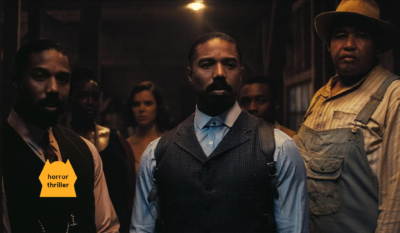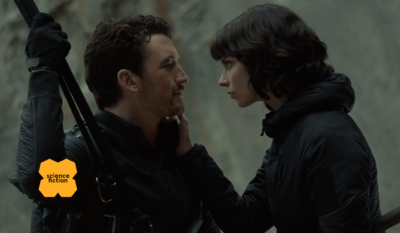A curmudgeonly professor, troublemaking student and kitchen manager are forced to spend winter break in an isolated boarding school. But they find warmth and family in the cold in The Holdovers.


While The Holdovers conjures warm and nostalgic storytelling with its '70s found family spirit and trio of outstanding performances — especially Da'Vine Joy Randolph — its emotional impact is stunted by its fractured focus.
The Holdovers is in theaters now.

The Holdovers channels the spirit of the '70s, particularly the warm embrace of nostalgia nestled within the found family genre. The characters, already fractured, navigate the challenges of Christmas cheer — which only adds more layers to their brokenness.
They're in a state of inertia. Each of them, burdened with clichéd labels they're desperate to escape from: a grieving mother, a privileged student indifferent to his privilege, and an unlikeable teacher unable to break free from the isolation imposed by his reputation as an old trout. It's only when the three collide as the last inhabitants of a prestigious New England boarding school over winter break that they begin to move forward, to open up their wounds, to unravel their hardened cocoons.
Paul Giamatti plays the rigid and uptight history teacher Paul Hunham whose profession has taken up the majority of his life. His performance is of a breathing, walking corpse. A scrupulous academic afraid of social interactions and relentless in eliciting collective groans from his students due to his hard-ass professorial attitude.
ADVERTISEMENT
Giamatti's physicality is a canvas of exaggeration, with his abnormal eyes, unkempt body, and a supposedly turgid scent that reflects his decay. He brings to mind the wicked monsters of the '50s or the rugged cowboys from the golden age of westerns. Giamatti's character, initially grizzled, undergoes a heartfelt metamorphosis, but The Holdovers presents enough elements to plant the idea that redemption might be a distant prospect for him.
Dominic Sessa devours each scene he's in as Angus Tully, a bright but troublemaking student. Sessa flips the tables on the smug arrogance of his character and lets loose a sensitivity that eludes most young actors his age. After learning that his mother has planned a honeymoon with his new stepfather, leaving him all alone for Christmas amidst the lifeless refrigerator of Barton, it's a desolate holiday season for him.
Under the care of Hunham inside the fortress that is the Barton campus, Angus battles his insecurities and often fights fellow holdovers, including the sharply annoying Teddy (brought to life with crisp, prickly behavior by Brady Hepner). But we also get softer moments that show Angus' more thoughtful side. His penchant for piano playing until the break of dawn and his empathetic interactions with a homesick boarding school roommate draw us into his pensive personality.
But the standout of the film is, without question, Da'vine Joy Randolph's compelling and rueful turn as Mary Lamb, the cafeteria administrator, who grieves the loss of her Barton alumnus son in the Vietnam War. Randolph, usually known for her comedic roles in The Lost City and Only Murders in the Building, anchors the narrative without resorting to melodrama and encapsulates the film's emotional warmth inspiring the awareness of life's privileges to the others.
ADVERTISEMENT
Unapologetically direct, she shares advice to her unexpected Barton companions embodying the role of a mother whose sorrow none of the characters could ever comprehend. It pains me that Mary's character felt underexplored, especially when the movie's theme revolves heavily around loss. Mary lost her son, Angus lost his father, and Paul, well, Paul has lost his sense of self. It would be low hanging fruit for the film to see Mary and Angus forge a connection through this shared familial grief, but for some reason, The Holdovers never reaches the full potential of that relationship.
Instead, Paul and Angus find themselves in a tango of authority and defiance. They see themselves in each other, yielding moments of genuine comedy amidst thematic echoes that, albeit, the film smirkingly repeats over and over again. The acting carries the pair's dynamic into the promised land because the material is quite uncomplicated (especially if you've seen ‘70s films).
The more nuanced storytelling nugget was Mary, who's only ever presented as the more reasonable adult figure to Angus rather than Paul. Yet, when the film's seemingly lone narrative innovation is ushered in, it feels like a half-hearted commitment. Mary development happens off-screen, as if quickly careening us away lest the heavy details detract from Angus and Paul.
But the thing is, Mary's story has some bearing on Angus and Paul. Robbing us of her moments with them and how that bleeds into her family or her contemplating her past makes her story feel like it's only scratching the surface. Randolph is phenomenal in her performance as Mary. There's a sense of fluidity in her stillness, and within her bereavement lies a captivating resilience. How does she move on from her son's death and move on as her own person? What does forging connections look like with privileged people who cannot bear to understand you and feel your pain?
ADVERTISEMENT
The Holdovers gives enough answers to these intriguing questions, yet it falters in delivering the necessary impact to justify them. Mary moves on, off-camera, while we're following along Angus and Paul's journey. The insight and development the pair share is assumed to have been shared by Mary too, but the film doesn't do enough to earn that. My favorite moment involves a subtle passage of time that shows how Mary begins to feel at peace with the grief that has enveloped her. It's all done with wordless eloquence as the camera gracefully glides through a bedroom space, revealing Randolph's vulnerability and strength. It's a touching moment that the film unceremoniously brushes over, despite it being the ace up its sleeve.
Perhaps a story with more emphasis on Randolph's character is wishful thinking, but for most of the film she felt separated in key moments when proximity with Angus or even Paul felt like the more inspired choice. Alexander Payne's direction is serene and his choice of soundtrack is undeniably evocative of the era, but in a year where Aunjanue Ellis-Taylor (Origin) and Charleen McClure (All Dirt Roads Taste of Salt) have brought to life inimitable portrayals of African-American women at odds with the cruelty of the world, Randolph's character and the underseen stories of grieving mothers in the ‘70s deserves to have a more nuanced concentration rather than just deferring to the warm embrace of nostalgia.
More movies, less problems
- Jordan Peele Unleashes the First Trailer for ‘HIM'
- ‘Sinners' is the best movie of the year | movie review
- Romantic sci-fi thriller ‘The Gorge' hits its mark | movie reivew
💌 Sign up for our weekly email newsletter with movie recommendations available to stream.
ADVERTISEMENT
Ryan Oquiza is a film critic for Rappler and CNN Philippines, and has contributed articles to Washington City Paper, and PhilSTAR Life. He is also the chief film critic of SINEGANG, one of the hosts of the film podcast Sine Simplified, and a Rotten Tomatoes approved critic. He has been accredited as press in numerous film festivals such as the Sundance Film Festival, New York Film Festival, and QCinema International Film Festival. He is currently a member of the International Film Society Critics Association.


